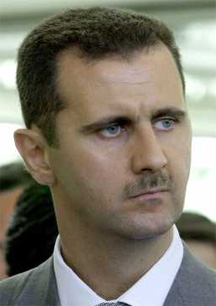AMMAN, (Reuters) – Syrian troops’ response to anti-government protests after Friday prayers will be a litmus test of the president’s agreement with the Arab League to stop shooting and open talks with the protesters, opposition leaders said.

Dozens of civilians were killed in the city of Homs yesterday, activists said, a day after Syria agreed to an Arab League plan to pull the army out of cities, free political prisoners and hold talks with opposition leaders.
Syria is under mounting outside pressure to halt its seven-month crackdown on mass demands for political reforms and President Bashar al-Assad’s resignation.
In Homs yesterday, tanks pounded a residential district and a witness who declined to be named said he saw dozens of civilian bodies at the National Hospital, which is controlled by the security forces.
The circumstances of their death were not clear. “They were all males with bullet wounds. A doctor told me they came from all over Homs,” he said.
Activists said a further 19 people were killed in tank shelling of the Bab Amro district, a centre of pro-democracy protests against Assad, and in shooting by snipers and soldiers elsewhere in Homs, a city of one million.
There was no independent confirmation of the killings. Tough restrictions on the media have made it hard to verify events on the ground since protests against Assad began in March, inspired by other revolts against autocratic Arab rulers.
“We have already seen the regime’s bloody response to the Arab initiative today in the form of intensified shelling on Homs, just after it had agreed to pull out its troops from urban areas and stop violence against the civilian population,” said Ahmad Ramadan, spokesman for the opposition Syrian National Council.
“The way the regime reacts to protests tomorrow will also be important toward gauging its commitment to the initiative. If its forces keep firing on protesters, Arab states may be forced to take a more decisive position and support the case for international protection for civilians,” Ramadan told Reuters.
The United Nations says more than 3,000 people have been killed in the crackdown. The authorities blame the violence on Islamist militants and armed gangs who they say have killed 1,100 soldiers and police.
Western sanctions and growing criticism from Turkey and Arab neighbours have raised pressure on Syria to end the bloodshed.
Qatari Prime Minister Sheikh Hamad bin Jassim al-Thani, who heads the Arab League committee behind the plan agreed in Cairo, said on Thursday: “We are happy to have reached this agreement and we will be even happier when it is implemented immediately.”
NO EVIDENCE
OF ACTION
The United States said yesterday it saw no evidence that Syria was taking steps to fulfil the Arab League deal, and said failure to do so would increase the pressure on Damascus.
